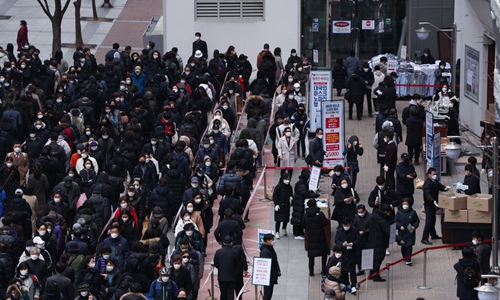South Korea faces consumption slump, external uncertainty amid COVID-19 outbreak: government report

People line up to buy face masks in front of a department store in Seoul, South Korea, March 3, 2020, the last day for the store to sell face masks, with each person allowed to buy a maximum of five pieces.(Xinhua/Wang Jingqiang)
South Korea is facing consumption slump and external uncertainty amid the COVID-19 outbreak across the world, a government report said Friday.
The Ministry of Economy and Finance said in its monthly economic assessment report, called Green Book, that the economy was faced with private consumption downturn, caused by the coronavirus pandemic, as well as a growing uncertainty over export and a sharp fall in employment.
The ministry said concerns spread about the global economic slump as economic activity weakened sharply in the United States and the European Union (EU), noting that uncertainty in the global financial market was alleviated on an active response from major economies.
Credit card spending reduced 4.3 percent in March from a year earlier, turning downward for the first time in about two and a half years since October 2017.
Revenue in department stores plunged 34.6 percent last month, keeping a downward trend for four straight months. Sale in discount outlets retreated 13.8 percent in the month.
Amid the fear of the virus spread, consumers avoided social gatherings and religious services, while refraining from shopping, travelling and eating-out.
Revenue by online retailers picked up 23.6 percent in March from a year earlier, after jumping 36.5 percent in the previous month.
Export inched down 0.2 percent in March from a year earlier amid the rising external uncertainty coming from the COVID-19 outbreak across the globe.
The number of jobs slumped 195,000 in March from a year earlier, marking the first decline in over 10 years.
Production in all industries slipped 3.5 percent in February from a month earlier, posting the biggest monthly slide in nine years since February 2011.
